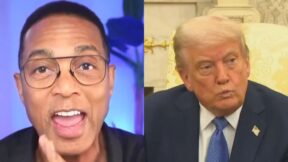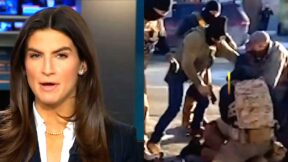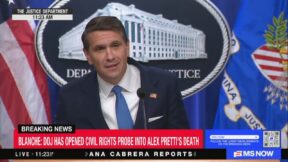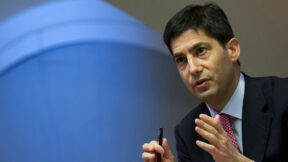This Director’s Films Showed Nicolas Cage Stealing the Declaration of Independence. His Latest Aims to Stop Trump From Stealing the Constitution.
In the 2000s, Jon Turteltaub directed the film National Treasure and its sequel, stories rich with American history that kick off with a character played by Nicolas Cage stealing the Declaration of Independence to access a secret code hidden within. This year, he’s turned his talents to trying to stop President Donald Trump from “stealing the Constitution,” metaphorically speaking, and hopes he’s cracked the code for speaking to Republicans in a short film he created for the anti-Trump PAC The Lincoln Project.
The six-minute film, titled “Wake Up,” debuted on an online town hall held by The Lincoln Project Thursday evening and tells the story of a family, all Trump supporters, in which the son was in a car accident and has been in a coma for three-and-a-half years.
“Wow, wow,” says the son. “Did I miss anything interesting?”
What comes next is several minutes of the family awkwardly recounting the events of Trump’s first term, including the border wall neither getting built nor being paid for by Mexico, the Stormy Daniels scandal, Trump’s much-maligned photo op in front of St. John’s Episcopal Church, Black Lives Matter protests, Russian bounties to the Taliban, and impeachment.
Finally, the son notices his family all wearing face masks — a common sight during the coronavirus pandemic but surely bizarre to someone who just woke up from a coma.
The family admits that the pandemic has become a major problem, with millions of Americans infected, over 150,000 dead, and testing still not available — and the economy tanking to boot.
Exasperated, the son takes drastic action to escape the reality of 2020, as the family continues to reminisce about Trump’s foibles, like the trouble drinking water during his West Point speech and “covfefe” tweet.
The film fades to black and a message appears on the screen: “Republicans…we need to wake up.”
“This guy was in a coma. What’s your excuse?”
Turteltaub — who said he reads Mediaite “all the time” — spoke exclusively to us by phone shortly after the town hall ended.
An “interesting thing” happened after National Treasure, he said: “there was a presumption that I must be a Republican because the film is patriotic.”
Turteltaub, who most assuredly leans left, questioned the “assumption” that many Republicans hold that you “must be a Republican to love the US, its history, its values, and its law.”
Those with liberal viewpoints were just as patriotic as those on the right, he argued, citing the ACLU as an example: a liberal organization that has gone to court to defend the free speech rights of groups whose views its members most certainly opposed, such as the Supreme Court case in which they defended the right of a neo-Nazi group to march in Skokie, Illinois.
He praised the ACLU’s commitment to constitutional principles, because “freedom of speech, regardless of how much you like that speech, was what really mattered.”
Part of the underlying problem, he thought, was the growing partisan divide, with both sides growing “meaner and meaner,” and spurring each other into further extremism. The Republican moderates today would have been viewed as the far right wing in the 1970s, and same for the Democrats — “there’s no middle anymore.”
But what was happening in America now, said Turteltaub, was beyond any partisan differences and instead was an attack directly not just the “dignity of the office” of president, but the “dignity of the whole country.”
He praised The Lincoln Project for having the “guts” to take the “Republican attack playbook” and instead of using it against Democrats, to “try and restore sanity to the Republican party.’
He initially got involved with the PAC, he explained, when he was invited onto “a big Zoom call” to meet some of the founding members. He had watched “a bunch” of their videos, and found himself “impressed” with the “smart, passionate” messaging.
“I thought, ‘Wow, wow, wow’ — this isn’t just an important thing, this is probably the only thing that makes a difference.” He sent them several script ideas, and they picked the one that eventually became “Wake Up.”
He laughingly described how “they said one thing no studio has ever done — ‘go do it, let us know when it’s done’ — as opposed to ‘go do it, and we’ll give you seven thousand notes on how to ruin it.'” (Every director’s dream, undoubtedly.)
Making the short film was fulfilling, he said, because “it actually mattered.”
The script for the short, Turteltaub said, drew directly from “the essence of the Lincoln Project, which is, if you are a Republican, do you have the ability to step back and see where your party is what you have in fact been supporting, and right your own personal ship?”
Turteltaub began by making a list of “all the egregious things Trump had done, regardless of party, and I thought, wow, if you just showed up here, after missing all that, you’d be shocked,” and tried to build on the humor of that concept, to be “fun and funny, and not just depressing and horrifying.”
“It doesn’t end so cheery, but there is comedy all the way to the end,” he said.
“The whole idea of the piece was about how hard it was for Republican families to hang on and convince themselves things are okay.”
He wouldn’t go so far as to say that he was sympathetic to Trump voters, and expressed frustration that Trump’s faults weren’t more clear to them in 2016, but added that he felt it was important to not write the Republican family as “Look how stupid they are!” but instead portray them as “good souls who are torn between not just loyalty to their party, but trying to hang on to the choice they made — you can see it’s taking a toll on them.”
“It’s a struggle for anyone to say ‘I was wrong,’ okay? But it’s also one of the most courageous things a person can do, and it’s what we teach our children,” said Turteltaub, himself a father of three.
“Why can’t we behave the way we’re trying to teach our children to behave? Every single thing you would teach your child is the opposite of Donald Trump…being honest, respecting women, being kind to all people, putting others ahead of you.”
Casting presented a unique challenge, said Turteltaub, because “we live in a blowback society” in this age of social media and boycotts threats from all sides. As a result, many actors are reluctant to take overtly political stands, especially those without the star power and personal finances to weather a storm.
“These actors are jeopardizing fan bases and comfort to do this.” They just want to play their characters, he explained. “You’re not announcing, if you play Charles Manson, that you agree with Charles Manson. But when you do a political ad, it’s hard to escape that.”
But the pendulum was swinging back, Turteltaub thought, because of the urgency of the current political moment. “They can’t hold back any more, the stakes are too high at this point,” and so they were now willing to take more risks to speak out.
“These people were not doing videos against Mitt Romney,” he quipped. “We’ve reached a whole new reality here.”
(The National Treasure films might be better known, but the author of this article is personally a fan of Cool Runnings, the 1993 Walt Disney production that Turtletaub directed early in his career.)
Turteltaub is definitely open to creating more films for The Lincoln Project, and when asked if we might see any Jamaican bobsledders in a future project, he chuckled and said considering the uplifting nature of that movie, it would have to be a positive message, perhaps encouraging people to register to vote. “You could probably get a bunch of them,” he mused, saying there had been a reunion for the film’s 25th anniversary not too long ago where he had gotten together with several members of the cast and crew and even the children of John Candy, who sadly passed away just a few months after the film premiered.
“Such great memories, it was really the beginning for me, and I loved that it made people feel connected to something and courageous,” he said, mentioning that the biracial British Formula One driver Lewis Hamilton has credited the movie with giving him “the courage to try, and to feel like he has a chance,” as one of the few minority racers, as well as one of the youngest.
Lincoln Project co-founder Rick Wilson told Mediaite the group was “honored” to have Turteltaub on their team, calling him “an amazing talent.”
“I think what Jon captured in this wonderful short film was the pathos of many Trump voters recognizing the choices they made — while difficult to admit — have led them to a place they never expected and don’t want,” said Wilson.
Watch the above video, via The Lincoln Project.
Editor’s Note: the author is a former political colleague and long-time friend of Rick Wilson.
New: The Mediaite One-Sheet "Newsletter of Newsletters"
Your daily summary and analysis of what the many, many media newsletters are saying and reporting. Subscribe now!






Comments
↓ Scroll down for comments ↓